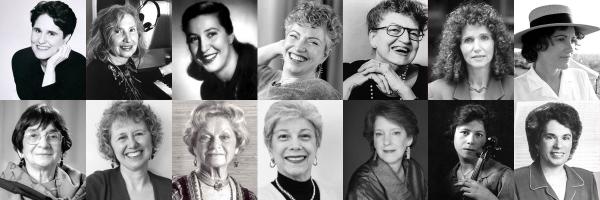Women Composers of the Milken Archive

March 05, 2019
Though women have contributed in great measure to the civic, professional, and artistic lives of their communities, rarely have their contributions been acknowledged on a commensurate scale. Combine the male-dominance of the field of music with the patriarchal barriers in traditional Judaism and it’s not hard to see why Jewish music has been no exception.
In America, especially in the last century, women have successfully challenged the status quo and made invaluable contributions as performers, educators, scholars, composers, and clergy. America’s first bat mitzvah, Judith Kaplan Eisenstein, became an influential composer and educator. Debbie Friedman was a self-taught amateur from Minnesota who forever changed the course of Jewish music when she began strumming a guitar to Hebrew liturgical texts. Count the women composers who have won the Pulitzer Prize in music and you’ll find several whose lives and work have touched on Jewish themes. The last one to do so, Julia Wolfe, has just premiered Fire in My Mouth, a new multimedia work on the Triangle Shirtwaist Factory Fire—which killed nearly 150, mostly immigrant women laborers—with the New York Philharmonic.
This March, in celebration of Women's History Month, we are proud to spotlight the women artists in our collection and their impact on Jewish Music in America, beginning with fourteen composers.
Learn about these talented artists below. Or, listen to their music on our Spotify playlist.
Vivian Fine
1913–2000
A student of Ruth Crawford Seeger and Roger Sessions noted for her chamber and dance music, Vivian Fine's accolades included a commission by the NEA and a Guggenheim Fellowship for composition.
Featured Works:
Canticles for Jerusalem
Debbie Friedman
1951–2011
A self-taught musician and songleader, Friedman was a pioneering figure in the movement that introduced folksong performance style and ethos into American synagogues in the latter half of the 20th century.
Featured Works:
Not by Might, Not by Power
The Purim Ball
Joelle Wallach
Born in New York, Joelle Wallach has studied with some of 20th-century America's leading composers, and has been heavily influenced by Near Eastern musical practices and philosophies.
Featured Works:
From the Forest of Chimneys
Shulamit Ran
An Israeli-born child prodigy and one of America’s foremost contemporary composers, Ran’s music is best described as freely atonal or pantonal, but with tonal points of reference.
Featured Works:
A Prayer
Miriam Gideon
1906–1996
Known for setting poetry and prose in the context of vocal chamber music, Miriam Gideon studied composition with Lazare Saminsky and Roger Sessions, and taught at the Jewish Theological Seminary and the Manhattan School of Music.
Featured Works:
Sacred Service
Shirat Miriam l'shabbat
Sheila Silver
Born in Seattle, Washington, Sheila Silver has studied with some of the most prominent figures in contemporary music, including Gyorgy Ligeti, Arthur Berger, Harold Shapero and Jacob Druckman. She has received several prestigious awards and acknowledgments.
Featured Works:
Shirat Sara
To the Spirit Unconquered
Judith Zaimont
Recipient of numerous awards, grants, and residencies, Judith Lang Zaimont is prolific composer, distinguished teacher, and founder of the New York-based ensemble, American Accent.
Featured Works:
A Woman of Valor
Meditations
Parable
Sacred Service for the Sabbath Evening
Judith Shatin
Head of the Center for Computer Music at the University of Virginia, Judith Shatin is an American composer whose work traverses a wide variety of genres and media.
Featured Works:
Adonai ro'i
And How My Brother is Cain
Hark My Love
Nun, Gimel, Hei, Shin
Ruth Schonthal
1924–2006
More romanticist than modernist, yet fully conversant with 20th-century developments, Ruth Schonthal's music includes many elements of European musical traditions, Mexican folk music, aleatoric music, and occasional nods to minimalism.
Featured Works:
A Bird Over Jerusalem
String Quartet No. 3
Emily Gresser
1894–1981
A 1913 article in the Yiddish periodical Di Tsukunft devoted to a discussion of Jewish or Jewish-born violinists who were already in or soon to join the pantheon of the giants of the instrument, presented Emily Gresser in the company of such esteemed artists as Mischa Elman, Efram Zimbalist, Joseph Joachim, Henryk [Henri] Wieniawski, Fritz Kreisler, and the young Jascha Heifetz.
Featured Works:
Hassidic Dance
Flory Jagoda
Recipient of an NEA National Heritage Fellowship, Bosnian-born musician and singer Flory Jagoda is one of the most important and recognized musicians in contemporary Sephardi music.
Featured Works:
Ocho kandelikas
Ursula Mamlok
1923–2016
A composer since childhood, Ursula Mamlok's music reflects a compositional style that, while grounded in tonality, also utilizes an array of atonal techniques.
Featured Works:
Cantata based on the 1st Psalm
Helen Greenberg
1939–2011
Born in Baltimore, Greenberg composed a large body of Jewish secular and sacred music—primarily art songs and choral works—which has been performed throughout North America, Europe, and Israel. (Photo Credit: Canadian Jewish News)
Featured Works:
Froyen shtime
Benjie Ellen Schiller
Cantor Benjie Ellen Schiller wrote a complete Sabbath eve service in 1991, which includes many settings of the basic traditional texts of the Sabbath liturgy—the first time she set those texts. A graduate of Boston University, she attended the School of Sacred Music at Hebrew Union College—Jewish Institute of Religion at its New York facility and received her cantorial investiture. (Photo Credit: Bet Am Shalom)
Featured Works:
V'ye'etayu














